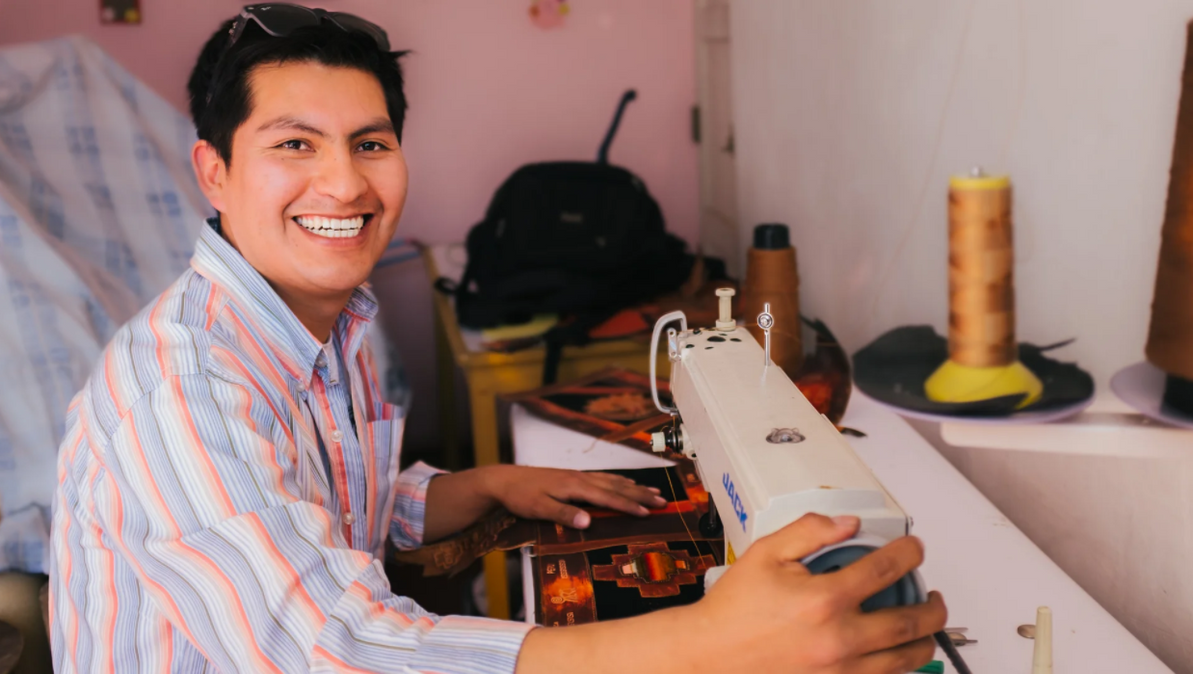Artisans' unchanged workplace during COVID-19 in the Fair Trade Industry.
What we can learn from the world’s independent makers, and why preserving these ways of working means sowing the seeds for better systems going forward.
The onset of COVID-19 prompted billions of workers to shift their work life to their home offices for the first time, introducing a new working style. Yet as a large part of society globally faces this apparently radical and sudden shift in how we live and work, we must remember that home-based work has existed in emerging economies, and right here in the U.S., for centuries.
One of the largest home-based industries is the artisan sector. It doesn’t just manufacture handmade goods but it fulfills the needs of a world economy and over 6.5 million home base workers between Guatemala, Mexico and Peru.
This is a world of mostly women primarily working with their hands: sewing accessories, knitting sweaters, adding pom-poms to the tops of winter hats, stringing tiny seed beads onto beaded jewelry, making the tassels that adorn everything from clothing to pillow covers. Despite the prevalence of this work in our everyday consumption, the majority of us hardly know these workers exist!
All of these tasks are tended to by human hands in a supply chain that extends into their homes. As we navigate how to move forward during this pandemic, the artisan community worldwide has some valuable lessons on what the future of work can—and should—look like.
We often think of artisanship as a thing of the past. But in many ways it is the future. At a time where there is an urgent call to bring Black, Indigenous, and people of color voices to the table, the cottage industry model—already perfected by Black, brown, and Indigenous communities for centuries—could help suggest a new way of work.
Our global and radical shift to remote work was prompted by a universal concern for health and safety. As workers everywhere sheltered in place, they did so in a shared effort to flatten the coronavirus curve and keep their communities healthy. Yet workplace concerns related to health and safety have been felt by the artisan sector long before COVID-19, and with good reason. In a pandemic, it’s clear that social distancing is not possible in a traditional factory setting. But these cramped quarters have led to health hazards for years.
For the past 22 years, we have connected their handmade creations with markets and businesses that can pay them what they’re worth. Skilled artisan work made where men and women produce from home, tending to their children and to their craft. Work that is compensated fairly and is sustainable.
Sanyork Fair Trade sources from artisan groups and produces in it’s own workshop creating structures and frameworks for the artisans to work constantly. As consumer demand for handicrafts continues to grow, we’ve been able to help solidify an artisan economy that works almost entirely from homes or our own small community workshop—and to provide the needed transparency to make sure this work is safe. For women, especially, this has been a saving grace: They can work from home, skip long commutes to a factory, and meanwhile tend to their families.
As the world wakes up to the power of remote work, consumers and peer companies need to recognize that it’s not just a matter of convenience, but a productive and resilient approach to work. Husbands and wives sit alongside each other working. Babies are cradled in the mother’s lap as she takes on the rhythmic movements of the loom or a knitting machine. When the midday sun gets too hot, they take a break, eat lunch, and rest. Work resumes in the evenings in the summer months, when it’s more tolerable.
These are small, simple adjustments to life. But they have a profound impact on the workforce. All of this, of course, results in a lighter carbon footprint for the artisans themselves and for our company as a whole.
For women, the benefits extend beyond family life. Working in countries where women can face harassment, abuse, or violence on their way to and from work, this option of remote work allows them to be more comfortable and in control of their safety and well-being.
In fact, during the pandemic, artisans working from home all over the world and from Peru to Mexico to right here in the U.S.—were nimble and resourceful enough to be able to pivot quickly to using their skills to make masks.
Finally, there’s perhaps the most compelling reason to embrace home-based work: Many people prefer it. More than three-quarters of the artisans interviewed reported that they prefer working from home. Once a week to visit the workplace, just to drop off the finished job, pick up raw materials and get paid. Once a week to meet team members and start new projects.
Similarly, during this pandemic, 80% of Americans say that they would rather continue to work remotely, yet labor law (here in the U.S. and most of the world) and corporate policies have yet to catch up.
Recent Posts
-
Aluminum sculptures that surprise and delight your clients.
The exterior is as important as the interior. That’s why, we recommend you add some aluminum sculptu …23rd Apr 2024 -
Changing Artisans Lives
"Your purchase of Sanyork Fair Trade products doesn’t only support the Peruvian artisan and helps ke …23rd Apr 2024 -
Eternal Elegance: The Timeless Appeal of Outdoor-Resistant Aluminum Statues"
Step into the world of enduring beauty and everlasting charm with outdoor-resistant aluminum statues …21st Apr 2024

